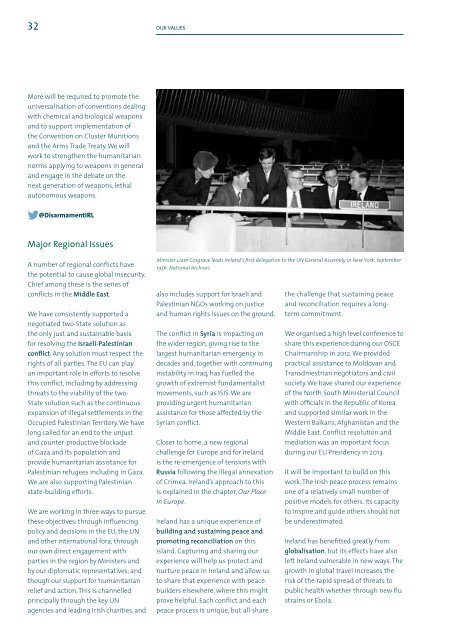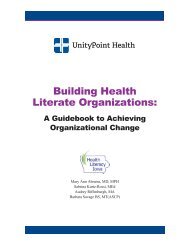the-global-island-irelands-foreign-policy
the-global-island-irelands-foreign-policy
the-global-island-irelands-foreign-policy
Create successful ePaper yourself
Turn your PDF publications into a flip-book with our unique Google optimized e-Paper software.
32<br />
OUR VALUES<br />
More will be required to promote <strong>the</strong><br />
universalisation of conventions dealing<br />
with chemical and biological weapons<br />
and to support implementation of<br />
<strong>the</strong> Convention on Cluster Munitions<br />
and <strong>the</strong> Arms Trade Treaty. We will<br />
work to streng<strong>the</strong>n <strong>the</strong> humanitarian<br />
norms applying to weapons in general<br />
and engage in <strong>the</strong> debate on <strong>the</strong><br />
next generation of weapons, lethal<br />
autonomous weapons.<br />
@DisarmamentIRL<br />
Major Regional Issues<br />
A number of regional conflicts have<br />
<strong>the</strong> potential to cause <strong>global</strong> insecurity.<br />
Chief among <strong>the</strong>se is <strong>the</strong> series of<br />
conflicts in <strong>the</strong> Middle East.<br />
We have consistently supported a<br />
negotiated two-State solution as<br />
<strong>the</strong> only just and sustainable basis<br />
for resolving <strong>the</strong> Israeli-Palestinian<br />
conflict. Any solution must respect <strong>the</strong><br />
rights of all parties. The EU can play<br />
an important role in efforts to resolve<br />
this conflict, including by addressing<br />
threats to <strong>the</strong> viability of <strong>the</strong> two-<br />
State solution such as <strong>the</strong> continuous<br />
expansion of illegal settlements in <strong>the</strong><br />
Occupied Palestinian Territory. We have<br />
long called for an end to <strong>the</strong> unjust<br />
and counter-productive blockade<br />
of Gaza and its population and<br />
provide humanitarian assistance for<br />
Palestinian refugees including in Gaza.<br />
We are also supporting Palestinian<br />
state-building efforts.<br />
We are working in three ways to pursue<br />
<strong>the</strong>se objectives: through influencing<br />
<strong>policy</strong> and decisions in <strong>the</strong> EU, <strong>the</strong> UN<br />
and o<strong>the</strong>r international fora; through<br />
our own direct engagement with<br />
parties in <strong>the</strong> region by Ministers and<br />
by our diplomatic representatives; and<br />
though our support for humanitarian<br />
relief and action. This is channelled<br />
principally through <strong>the</strong> key UN<br />
agencies and leading Irish charities, and<br />
Minister Liam Cosgrave leads Ireland’s first delegation to <strong>the</strong> UN General Assembly in New York, September<br />
1956. National Archives<br />
also includes support for Israeli and<br />
Palestinian NGOs working on justice<br />
and human rights issues on <strong>the</strong> ground.<br />
The conflict in Syria is impacting on<br />
<strong>the</strong> wider region, giving rise to <strong>the</strong><br />
largest humanitarian emergency in<br />
decades and, toge<strong>the</strong>r with continuing<br />
instability in Iraq, has fuelled <strong>the</strong><br />
growth of extremist fundamentalist<br />
movements, such as ISIS. We are<br />
providing urgent humanitarian<br />
assistance for those affected by <strong>the</strong><br />
Syrian conflict.<br />
Closer to home, a new regional<br />
challenge for Europe and for Ireland<br />
is <strong>the</strong> re-emergence of tensions with<br />
Russia following <strong>the</strong> illegal annexation<br />
of Crimea. Ireland’s approach to this<br />
is explained in <strong>the</strong> chapter, Our Place<br />
in Europe.<br />
Ireland has a unique experience of<br />
building and sustaining peace and<br />
promoting reconciliation on this<br />
<strong>island</strong>. Capturing and sharing our<br />
experience will help us protect and<br />
nurture peace in Ireland and allow us<br />
to share that experience with peace<br />
builders elsewhere, where this might<br />
prove helpful. Each conflict and each<br />
peace process is unique, but all share<br />
<strong>the</strong> challenge that sustaining peace<br />
and reconciliation requires a longterm<br />
commitment.<br />
We organised a high level conference to<br />
share this experience during our OSCE<br />
Chairmanship in 2012. We provided<br />
practical assistance to Moldovan and<br />
Transdniestrian negotiators and civil<br />
society. We have shared our experience<br />
of <strong>the</strong> North South Ministerial Council<br />
with officials in <strong>the</strong> Republic of Korea<br />
and supported similar work in <strong>the</strong><br />
Western Balkans, Afghanistan and <strong>the</strong><br />
Middle East. Conflict resolution and<br />
mediation was an important focus<br />
during our EU Presidency in 2013.<br />
It will be important to build on this<br />
work. The Irish peace process remains<br />
one of a relatively small number of<br />
positive models for o<strong>the</strong>rs. Its capacity<br />
to inspire and guide o<strong>the</strong>rs should not<br />
be underestimated.<br />
Ireland has benefitted greatly from<br />
<strong>global</strong>isation, but its effects have also<br />
left Ireland vulnerable in new ways. The<br />
growth in <strong>global</strong> travel increases <strong>the</strong><br />
risk of <strong>the</strong> rapid spread of threats to<br />
public health whe<strong>the</strong>r through new flu<br />
strains or Ebola.



